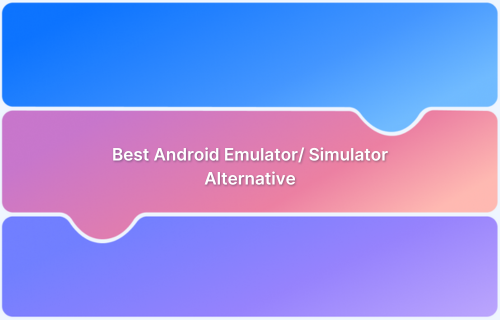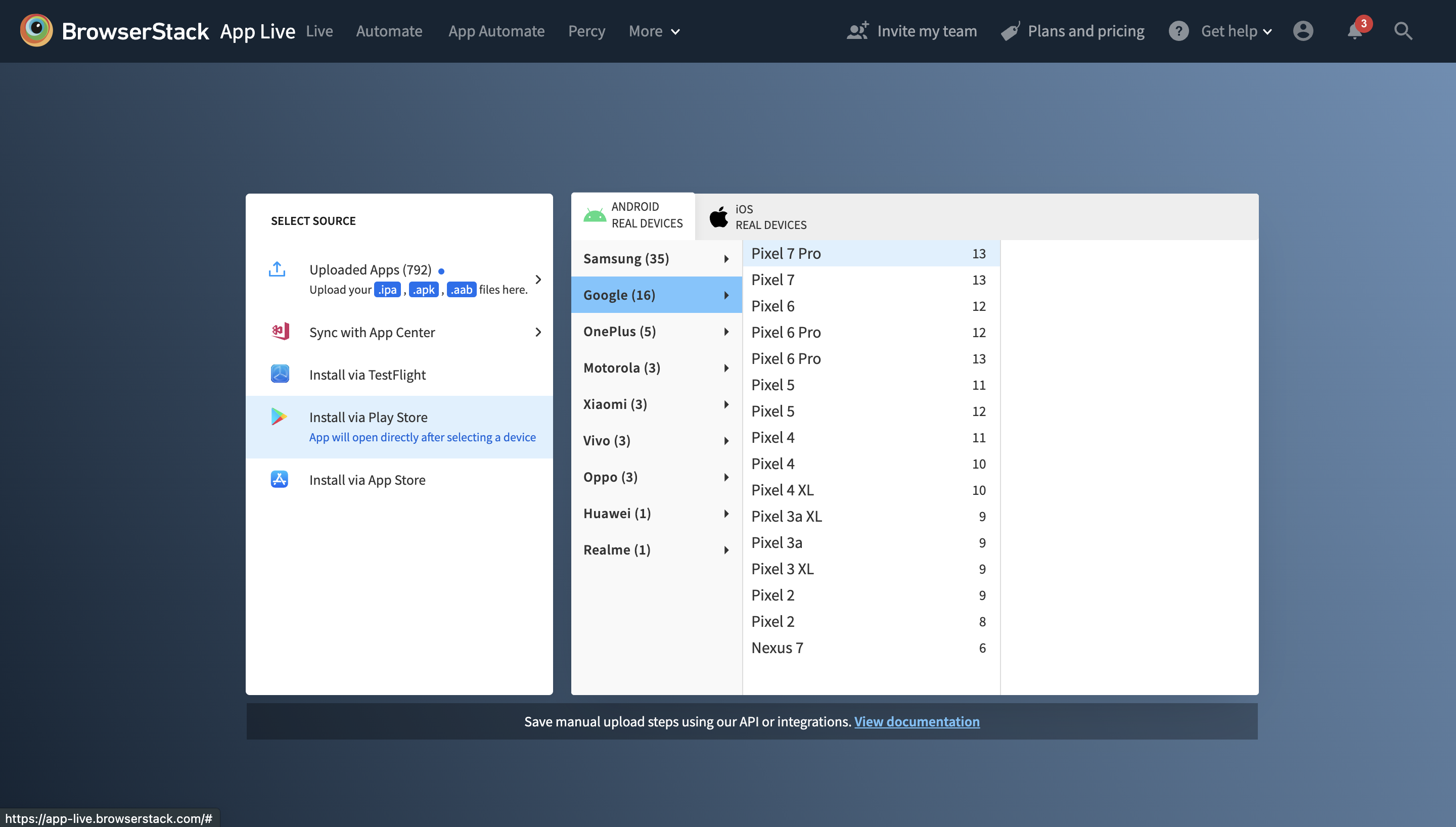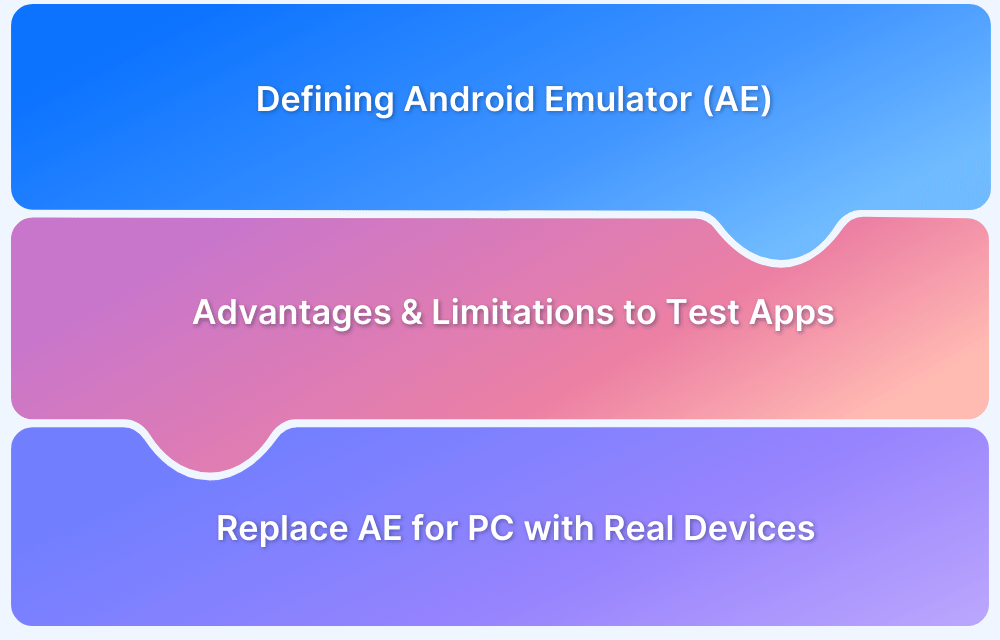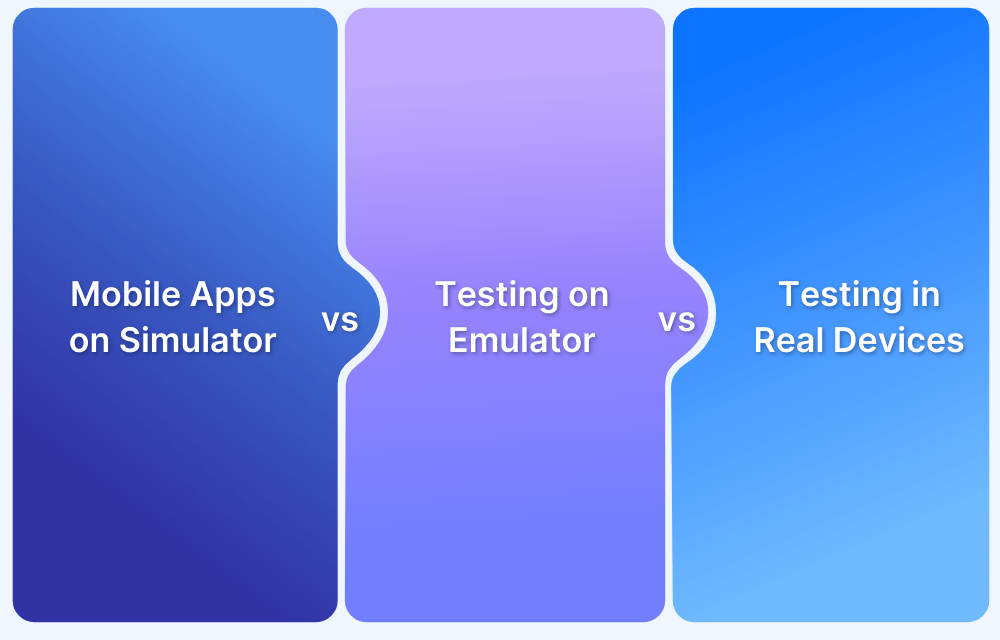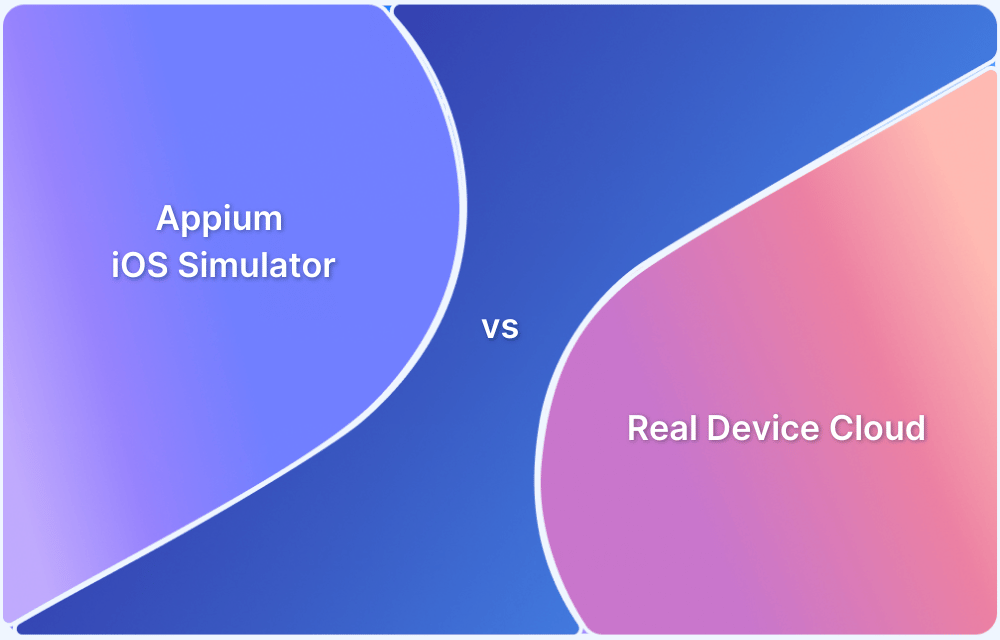Developers and QAs commonly use Android emulators and iOS simulators to test mobile apps. However, testing on emulators and simulators is inadequate for developing market-ready apps.
Overview
What is an Android Emulator?
An Android emulator is software that lets testers and developers test their mobile apps from a desktop or laptop by simulating an Android device. It eliminates the need for an actual physical device by supporting capabilities like touch gestures, hardware sensor simulation, etc.
Why Choose an Emulator/Simulator Alternative for Android
- Slow performance
- No accurate simulation of device performance
- Not always updated
- Inability to test certain hardware-dependent features
- Inability to simulate real-user conditions
- Localization constraints
This article discusses further why Android emulators may not be the right choice for testing and why you should look for an alternative that actually lets you test on real devices.
What is an Android Emulator?
An Android emulator is a software program that allows QAs to run mobile apps and games on a desktop or laptop. They provide a way to test and develop mobile apps on a computer without needing a physical device. They mimic the functionality of a physical Android device and include features such as the ability to simulate touch and gesture input and access to the device’s hardware sensors.
The Android emulator simulates the Android operating system and its associated hardware, such as a device’s CPU, memory, storage, and sensors, allowing developers to test their apps on different versions of Android and various device configurations.
Disadvantages of Emulators/Simulators
Here are the disadvantages of emulators/simulators that demand the need for an alternative for testing:
- Inaccuracy in Performance: Emulators and simulators do not accurately mimic the performance of a real device, so testing on them may not reveal all performance-related issues that may occur on actual devices.
- Slow Performance: They are resource-intensive, and their performance is rather slow and inconsistent, especially when it comes to complex applications.
- Feature Limitations: They may not have all the features and capabilities of real devices, which can lead to incomplete testing.
- Outdated: Emulators and simulators are not always updated to the latest mobile operating system version, which can lead to testing on outdated software.
- Limited Hardware Dependency: Emulators and simulators may not be able to test certain hardware-dependent features such as camera, GPS, and sensors.
- Inability to Simulate Real-world Conditions: Emulators and simulators cannot test real-world conditions such as network conditions, battery level, etc.
- Inability to Test Device-Specific Features: It is not possible to test the apps with different resolutions, in-built apps, and other features unique to the device.
- Localization Restrictions: Emulators and simulators cannot test the apps for different languages, time zones, and other localization settings.
- Security limitations: Their ability to test apps under secure environments or with hardware encryptions is limited.
Testing on emulators and simulators does not replace the need for testing on actual devices, so it is important to also test on various real devices to ensure the app is working correctly across different hardware and software configurations.
What is the Best Android Emulator Alternative?
An ideal alternative to Android emulator is using a real Android or iOS mobile handset basis the application under test. This allows for testing on actual hardware and can provide a more accurate representation of how the app will perform on a user’s device.
- Testing on real handsets provides a more accurate representation of how the app will perform on a user’s device, including real-world network and performance conditions.
- However, it’s not feasible for all organizations to procure and maintain the latest handsets of all brands and configurations.
- It demands significant investment for setting up on-premise device labs or device farms.
Real Device Cloud as Android Emulator Alternative
To address the test infrastructural challenges, teams can leverage platforms like BrowserStack for testing apps in real user conditions. Its real device cloud offers 3500+ real devices and browser combinations. Additionally, it allows developers to run automated tests on multiple devices simltaneously, saving time and resources.
It offers devices from leading vendors like Samsung, Apple, OnePlus, Motorola, Google, etc.
To begin app testing on BrowserStack, one needs to:
1. Sign up for free on BrowserStack.
2. Upload your app (.ipa or .apk file) Learn how to upload .aab, .apk, and .ipa files.
3. After uploading the app, choose the desired device for debugging/testing purposes (Pixel 7 Pro, in this case).
4. An App-live session begins immediately once you select the device. The image below represents an App-Live session on Pixel 7 Pro.
Your test app is immediately installed once the session starts. That’s how quickly you can start testing your apps on BrowserStack.
Benefits of Using BrowserStack’s Real Device Cloud
The real device cloud allows mobile QA teams to test in real environments. It helps teams to yield accurate test results. With this Android emulator alternative, QAs also get access to the following features:
- Perform Geolocation testing for apps
- Test apps in Portrait and landscape mode
- Test the performance of apps in poor network conditions
- Conduct screenshot testing of apps for security concerns
- Test the app’s behavior in different languages.
With a secure and comprehensive test infrastructure available, teams can improve their test coverage and release apps faster.
Note: With the recent updates in BrowserStack’s real device cloud, teams can now test apps on the all-new Pixel 7 & iPhone 14 through their web browsers.
Other Emulator Alternatives for Android
If you are still looking for a traditional Android emulator alternative, here are 5 popular tools in the market. Though they may come with better features overcoming a few limitations of emulators in general, they can’t be entirely relied on due to some major shortcomings. So, make it a point to compare your objectives with the features of these emulator alternatives to ensure your website or app quality is not compromised.
1. BlueStacks
BlueStacks is one of the most popular Android emulator alternatives, that mainly focuses on gaming apps. However, it also supports various other apps as well.
Key Features
- Keyboard mapping
- Great compatibility with Android apps
- Multi-instance support
Drawback: Though BlueStacks offers some great features, it is heavy on system resources. Now, this can slow down app testing, especially if it’s a resource-intensive application.
2. NoxPlayer
NoxPlayer is a lightweight Android emulator alternative that is focused on gaming and is built to offer smoother performance.
Key Features
- Custom key mapping
- Root access for advanced configurations
- Multiple instance support
Drawback: Not the right fit if you are testing a non-gaming app, as frequent crashes and other stability issues can occur during testing.
3. LDPlayer
LDPlayer is a performance-focused Android emulator alternative designed for gaming and resource-heavy apps.
Key Features
- Multi-instance support
- Customizations for the Android kernel
- Low-latency gaming optimization
Drawback: It is not the best platform for complex testing environments as they have limited development-focused tools.
4. Android Studio Emulator
Android Studio Emulator is Google’s official emulator built for testing and debugging Android applications.
Key Features
- Supports varied device configurations and Android versions
- Integrated with Android Studio for Development
- Debugging functionalities
Drawback: Extremely slow and resource-intensive, resulting in delays in testing efforts.
5. MEmu Play
A popular Android emulator built for both gaming and app usage. It is highly compatible with Android applications.
Key Features
- Supports various Android versions
- Multi-instance management
Drawback: It is not the best option for detailed app testing scenarios, as it offers limited development tools and occasionally has compatibility issues with non-gaming apps.
6. Google Play Emulator
Google Play Emulator is an official emulator that is integrated with Android Studio for testing Android apps with Google Play Services. It is ideal for testing apps that depend on the Google ecosystem.
Key Features
- Comes with Google Play Store and Google Play Services
- Supports a wide range of Android APIs and device configurations
Limitations: Can be resource-intensive, and some Play Store functionalities may need additional setup for efficient testing.
7. Android TV Emulator
Android TV Emulator is a specialized emulator that is designed for testing and debugging Android TV apps.
Key Features
- Mimics Android TV interface along with remote control support
- Supports Google Play Store for TV apps
Limitations: Performance can fluctuate depending on system specifications. Moreover, it may not be ideal for mobile app testing due to its limited touchscreen support.
What is an iOS simulator?
An iOS Simulator is a built-in tool within the Xcode IDE for macOS. It allows developers to simulate and test their iOS, watchOS, and tvOS apps on a computer, rather than on a physical device. The simulator is designed to closely mimic the behavior and performance of an actual iOS device, including support for various screen sizes and resolutions, accelerometer, camera, and other hardware features.
The simulator also allows developers to test their apps in different software configurations, such as iOS versions of different device orientations. It is a valuable tool for developers to quickly test their apps and identify and fix bugs without needing a physical device.
Although emulators and simulators allow mimicking the functionality of a real device, there are several disadvantages to it testing mobile apps.
Conclusion
- Using an Android emulator or iOS simulator is suitable in the initial stages of testing applications. However, it is not an accurate method when it comes to testing mobile applications in a fragmented ecosystem.
- Leveraging BrowserStack as an Android emulator alternative makes it extremely intuitive and effortless for teams to test applications on the desired device-OS combination regardless of the operating system you use.
- Simply Signup > upload your apps > choose the desired device, and start testing from anywhere in the world.
Go beyond browser/OS compatibility and test under real user conditions with BrowserStack.
